In the fast-paced world of game development, staying ahead of the curve is essential. As a game creator, you seek innovative solutions to bring your virtual worlds to life. That's where AI game generators come into play. Here's the ultimate list of the top 10 AI game generators you need to know.
These AI game generators are tools and your creative allies in crafting immersive gaming experiences. They're poised to revolutionize your game design process. They can generate landscapes, characters, and even intricate storylines. We'll help you make informed decisions about the tools you use.
In this article
Discovering the Power of the AI Game Generator
The emergence of AI game generators has been a game-changer. But what exactly is an AI game generator? At its core, it's software infused with artificial intelligence. It can create, refine, and enhance various elements within video games.
Here's how it works: AI game generators use machine learning algorithms by analyzing datasets. These algorithms generate content that's tailored to player preferences. This results in a dynamic gaming experience that adapts and evolves in response to player actions. Thus ensuring engagement and immersion at every turn.
Introducing AI into game development marks a fresh, immersive, individualized gaming era. This involves AI-driven game technology that automates the process.
AI’s impact on game development is truly remarkable. Its procedural generation, player profiling, and AI-generated storylines shape the gaming landscape. The gaming industry is on the verge of big changes as AI technology advances. It offers smarter, user-friendly, and personalized gaming experiences for players worldwide.
Here are some of the prominent benefits of using AI game generators:
- Efficiency: AI generators speed up game development. This results in time and effort optimization.
- Creativity: These tools infuse fresh ideas into games, ensuring that no two experiences are alike.
- Cost-Effectiveness: AI game generators help lower production costs by automating content creation. This makes it easier for developers to stay within budget.
- Personalization: AI adapts games to individual player preferences, enhancing engagement and retention.
- Accessibility: AI helps small studios and developers compete with big industry players.
- Scalability: AI game generators scale easily to meet the ever-evolving needs of game developers.
- Innovation: These generators enable developers to explore new and uncharted gaming territories.
- Consistency: AI ensures that the quality and consistency of gameplay remain top-notch.
These possibilities make AI game generators a crucial tool for game developers. Thus enriching the industry and elevating the gaming experience to new heights.
10 Best AI Game Generators
Building upon its remarkable benefits, let's now have the 10 Best AI Game Generators. These innovative tools are set to reshape the gaming landscape. Thus offering you unparalleled creative freedom and efficiency. Discover how they're transforming the industry and making game development more accessible.
| AI Game Generators | Platforms | Free/Paid | Best For |
| Promethean AI | Web, Desktop | Paid | 3D Environment Creation |
| Ludo.ai | Web | Paid | AI-Powered Gameplay |
| InWorld | Web, Desktop | Paid | Realistic Character Creation |
| Scenario | Web | Paid | Game Art Creation |
| Charisma | Web | Paid | AI-Powered Narratives |
| Leonardo.AI | Web | Paid | Game Asset Creation |
| Hotpot.AI | Web | Paid | AI-Enhanced Graphics |
| Meshy | Web | Paid | 3D Mesh Management |
| Layer.AI | Web, Desktop | Paid | 3D Layer Generation |
| Rosebud.AI | Web | Paid | AI-Driven Code and Assets |
1. Promethean AI
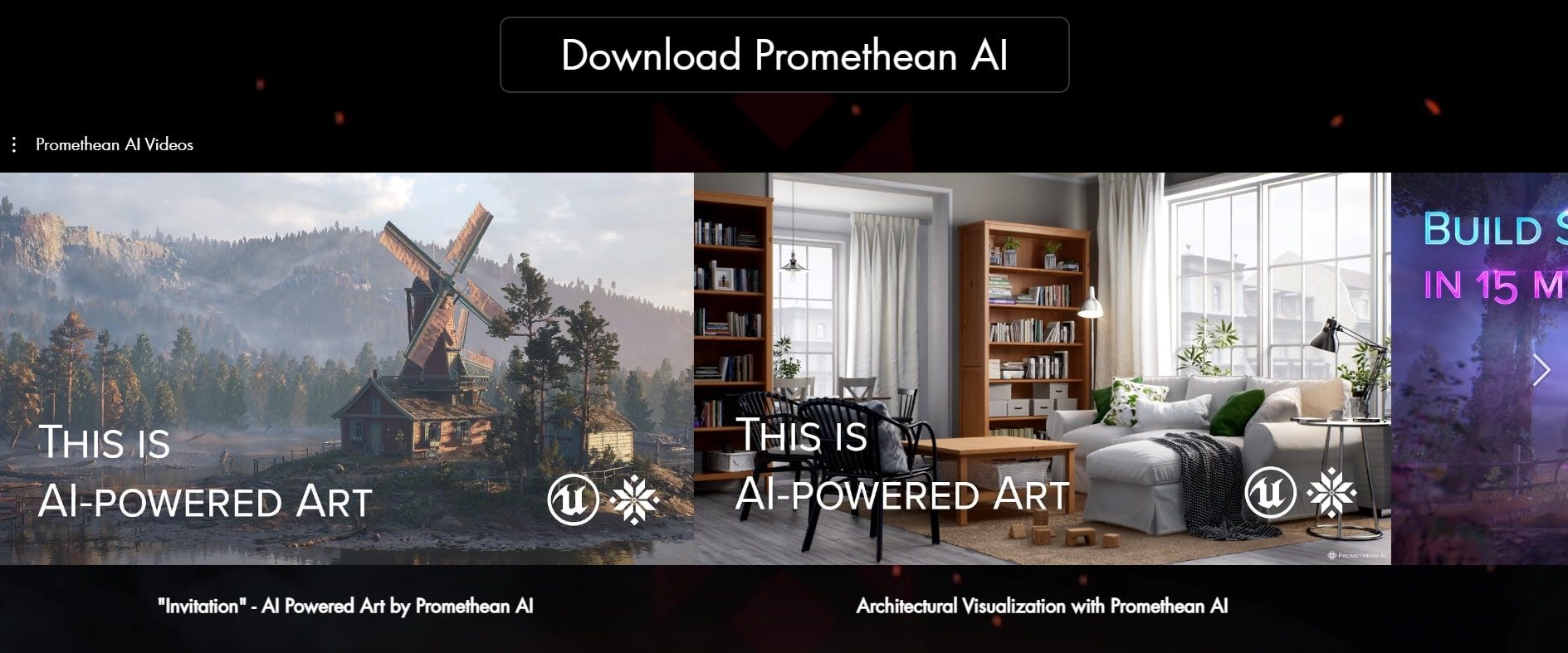
Promethean AI stands at the forefront of innovating game environment generation. This tool leverages AI's capabilities to streamline the construction of 3D environments. One of its standout attributes lies in its capacity to create diverse environments. Promethean AI actualizes your concept, expediting the game development journey.
Highlights
- 3D Environment Generation: Promethean AI simplifies creating 3D game environment assets.
- Natural Language Interface: Promethean AI provides a user-friendly experience. Game developers can interact with the tool using simple and human-like language.
- Supports a Wide Array of Environment Types: Promethean AI supports many environment types. This might include forests, futuristic cities, post-apocalyptic wastelands, or any other imaginative landscape. This feature makes it a helpful tool spanning different genres and themes.
2. Ludo.ai
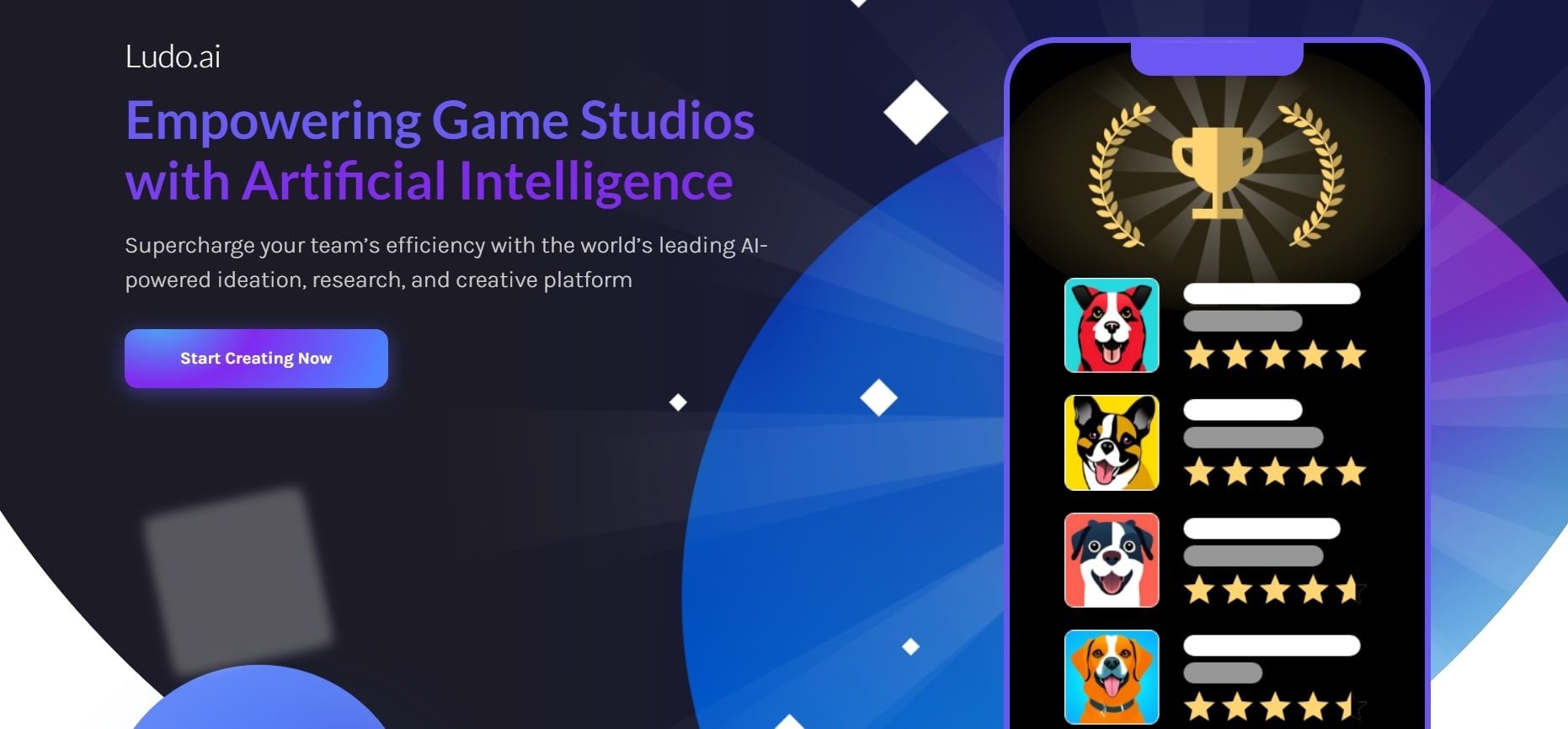
Ludo.ai leverages the power of AI to see player actions and adjust gameplay. Ludo.ai design games that flexibly align with a player's proficiency, preferences, and gaming approach. Moreover, it offers invaluable insights into player conduct for facilitating game enhancement.
Highlights
- Gameplay Adaptation: The AI adjusts various gameplay elements. This includes difficulty levels, challenges, and in-game events.
- Analytical Algorithms: The platform collects and data processes on how players interact with the game. This can be their choices, strategies, and gaming patterns. Understanding this helps developers and operators make data-based choices to improve gaming. Thus, optimizing monetization strategies, and implementing game design improvements.
- Customized Gameplay Experiences: Ludo.ai tailors gameplay to suit players. It is whether they want a challenge, relaxation, or a specific game style.
3. InWorld
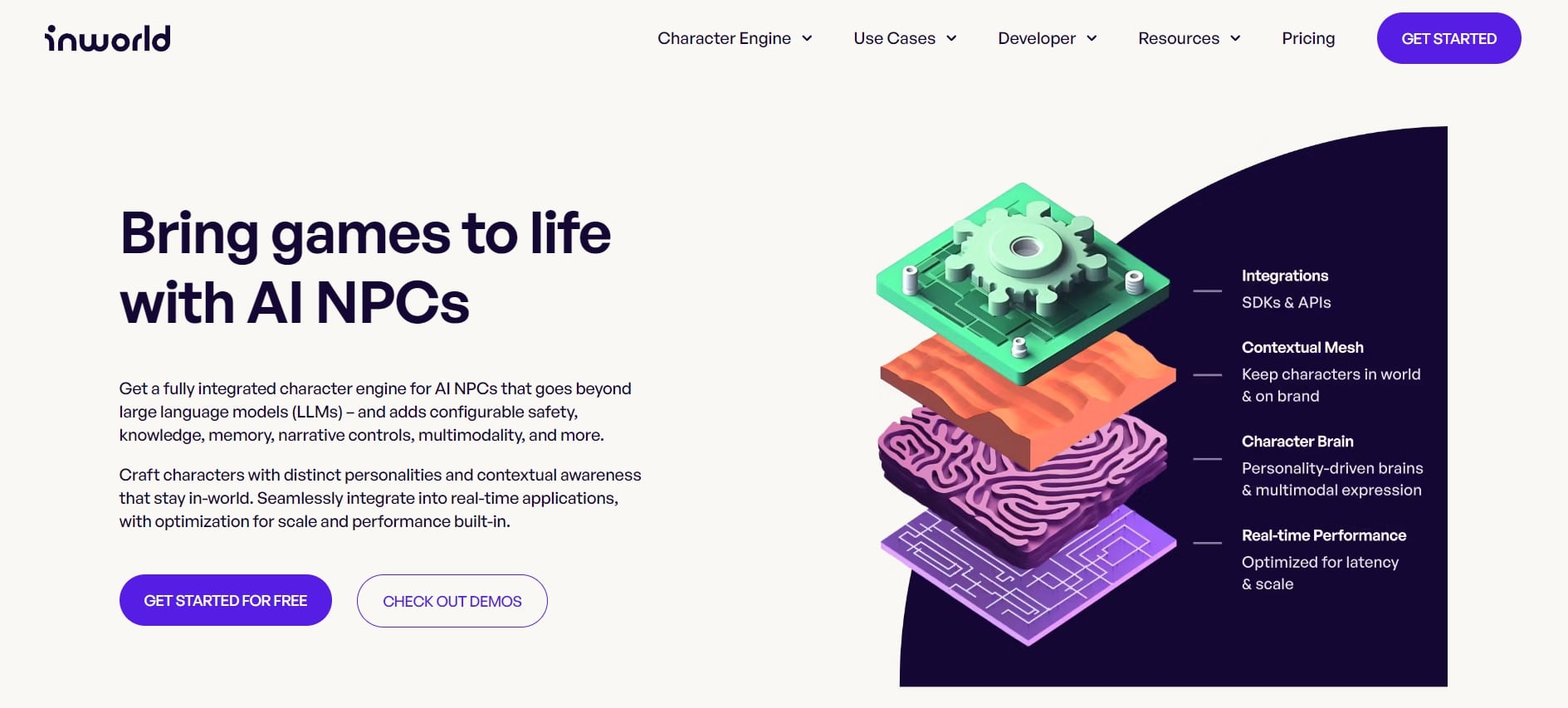
InWorld assists game developers in crafting lifelike characters. Utilizing AI, it produces photorealistic characters according to your preferences. This simplifies the process of crafting distinctive, top-tier characters for your games. InWorld offers comprehensive customization, allowing you to tailor the character's look. This spanns from facial attributes to clothing for character design.
Highlights
- Character Generation: InWorld's standout feature lies in using artificial intelligence for character generation. This streamlines character creation for game developers.
- Photorealistic Character Generator: The AI can generate characters with striking realism. These characters boast lifelike facial features, textures, and details.
- Different Customization Options: Game developers can fine-tune every aspect of their characters. This can be from facial features and expressions to clothing and accessories. Experiment with various parameters to achieve the character you need.
4. Scenario
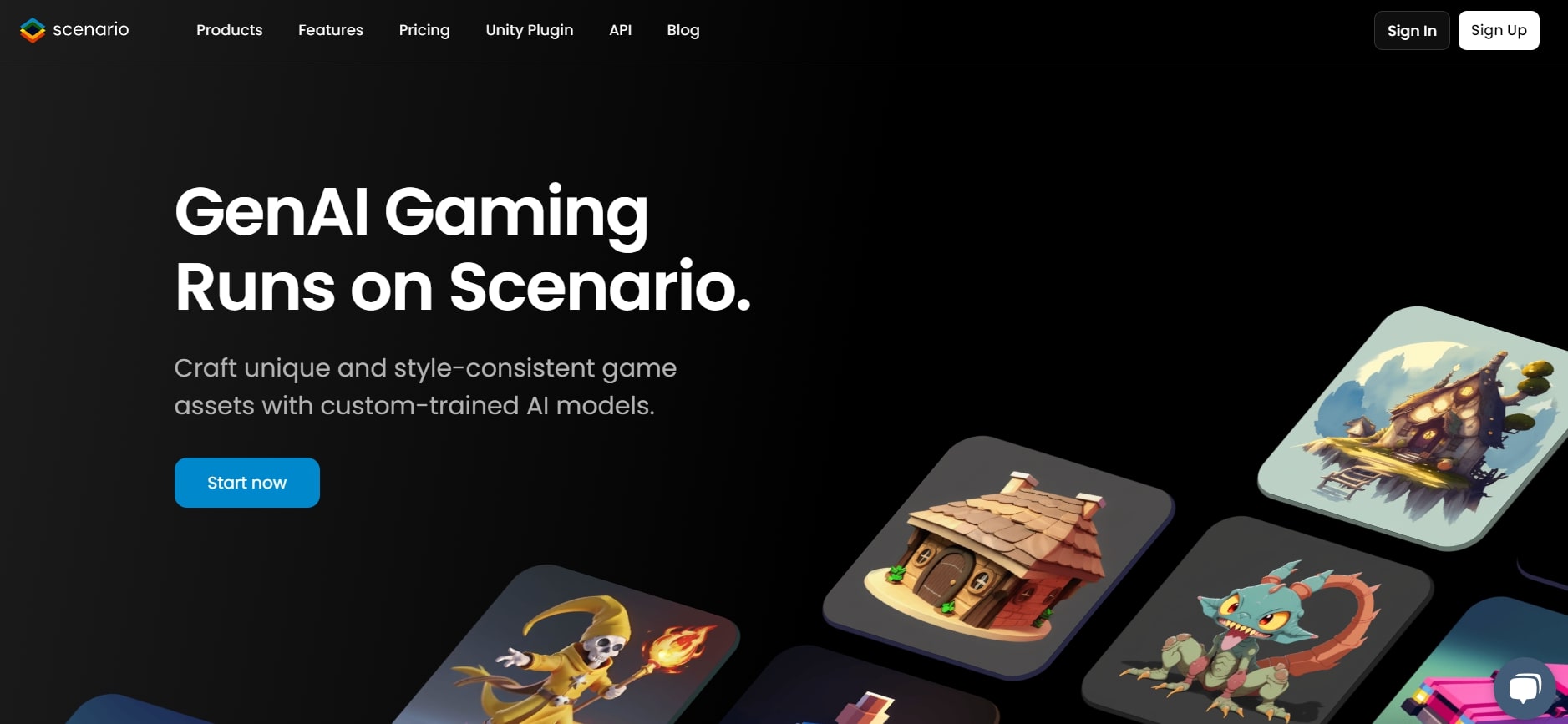
Scenario is an advanced AI-powered tool tailored for game art creation. Its primary aim is to assist game developers in producing distinct game art.
The AI can see the patterns, color palettes, and design elements by uploading the training data. Furthermore, Scenario provides image refinement, bookmarking, deletion, and export options.
Highlights
- Unique Art Style: AI models are trained to learn an artist's unique style and creative direction. Thus, allowing them to understand the specific design elements preferred by the artist.
- Generate Multiple Images: Scenario makes multiple images. It lets developers create up to 16 images in one go, saving time and making their work more efficient.
- Create Different Modes: Scenario offers a diverse set of 12 modes. These modes give you precise control over different things. This includes composition, style, and thematic elements of AI-crafted visuals.
- Modify Image Generations: Scenario allows you to manipulate the generated content. You can modify images by combining various modes and settings to meet their needs.
5. Charisma
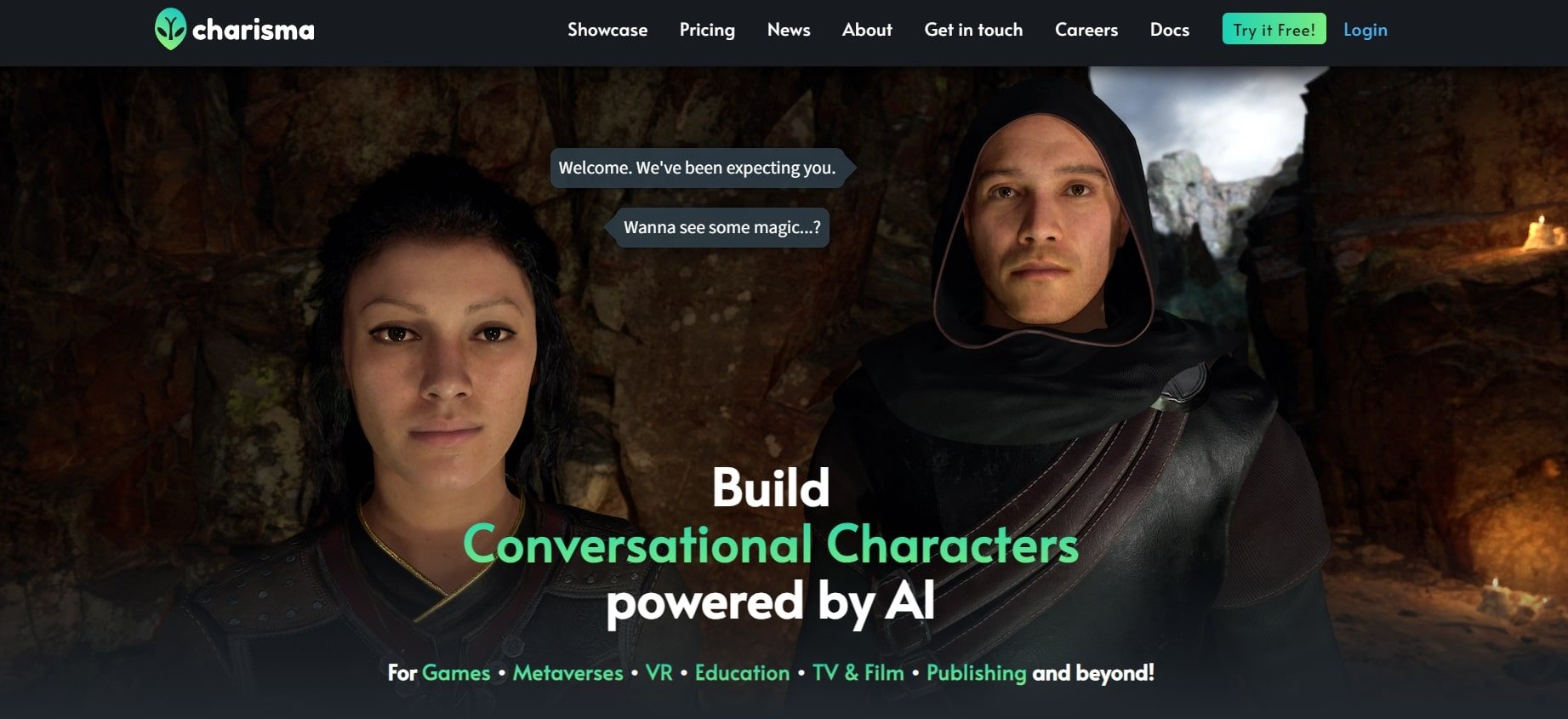
Charisma is an AI-driven solution crafted to generate narratives. It generates storylines, characters, and dialogues. Charisma responds to player choices, delivering a distinctive experience for every player.
Highlights
- Narrative Generation: Charisma's standout feature is its AI-powered narrative generation capability. It creates captivating and immersive stories to revolutionize game development.
- Detailed Storylines and Characters: Charisma introduces dynamic storylines and characters into game development.
- Realistic Dialogue Creator: Charisma generates realistic and authentic dialogue for in-game characters. This makes the characters feel more lifelike.
6. Leonardo.AI
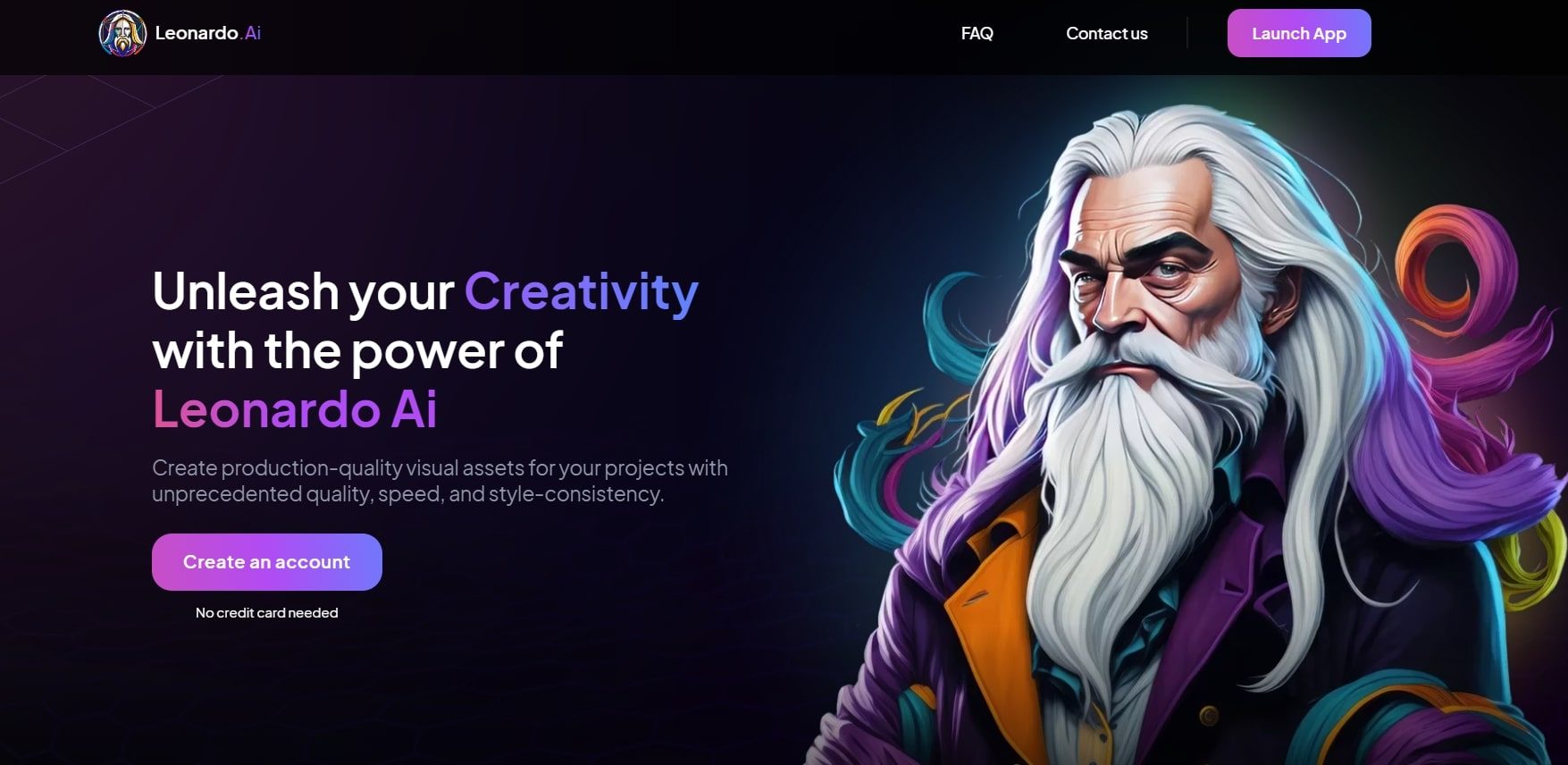
Meet Leonardo.AI, a game-changer in creating video games. With Leonardo AI, creating special and different game genres is easy. You can experiment with characters and places that are compatible on different devices: desktops, tablets and smartphones.
Highlights
- Asset Generation: Leonardo.AI automates the often labor-intensive process of creating game assets. By leveraging AI algorithms, it produces high-quality assets tailored to your specific needs.
- Supports Different Asset Types: Whatever you need, this tool can deliver a broad spectrum of asset types. Thus, accommodating the needs of various game genres and styles.
- Asset Optimization: The AI optimizes assets for better performance. This enables smooth gameplay experiences on various devices: desktops, tablets and smartphones.
7. Hotpot.AI
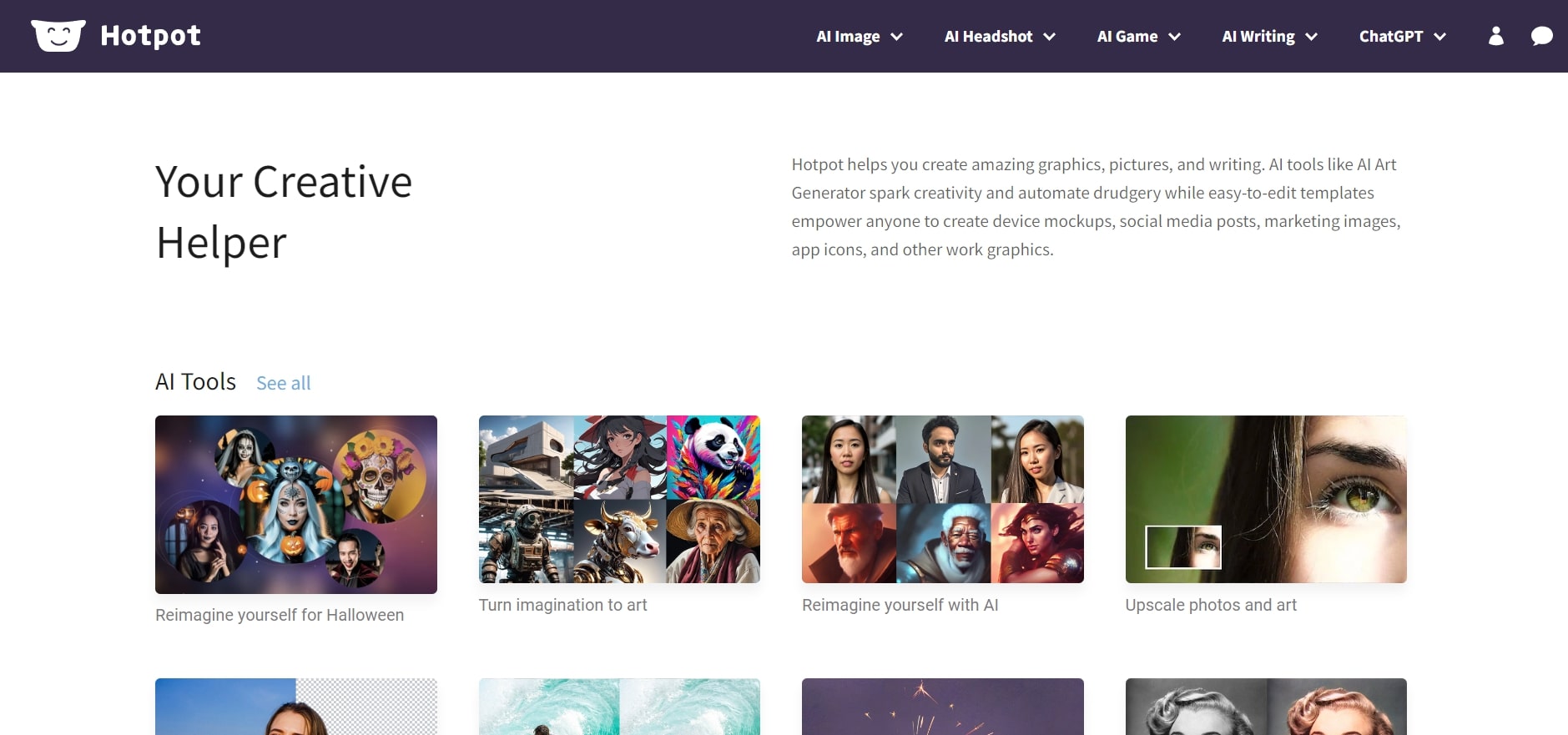
Hotpot.ai is a versatile tool designed to help with various creative tasks, including making game assets. It's not limited to game assets; you can create graphics, pictures, and text with it. This tool is great for game developers, marketers, and graphic designers.
Highlights
- Create Unique High-Quality Assets with Ease: Hotpot.ai makes creating special and top-notch assets for your games easy. It turns your ideas into beautiful art, making your creativity come to life.
- Create Realistic Character Headshots: You can make realistic headshots for your game characters. This is super handy for giving your characters their unique look.
- Automate Your Writing Tasks: Hotpot.ai offers AI Copywriting, which can help you write stuff. This is useful, especially when you need words for your games.
- Create Professional-Quality Graphics in No Time: Hotpot.ai provides templates. You can quickly edit these templates to fit your needs, making it easy to make awesome graphics that look like a pro did them.
8. Meshy
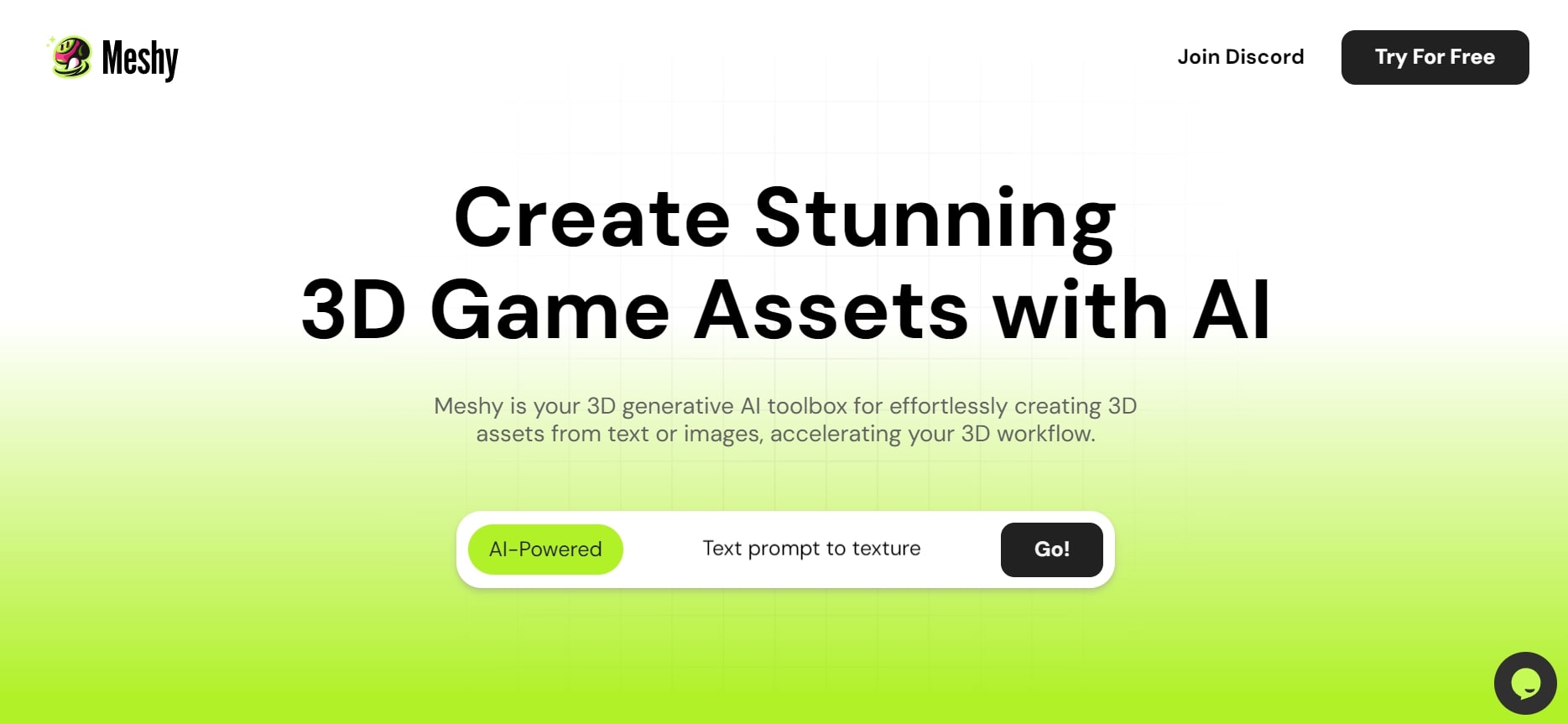
Meshy simplifies the process of working with 3D games, making it more accessible and efficient for game developers and creators. This tool proves to be invaluable as it assists in various aspects of managing their 3D games. It helps you handle, inspect, and enhance their 3D games.
Highlights
- Mesh Analysis: Meshy uses smart algorithms to make your 3D work better and fit perfectly in your games.
- Retopology and UV Mapping: Meshy can do retopology and UV mapping for you. This saves you heaps of time and effort.
- Analytical Performance Insights: With Meshy, you get a detailed report card for your 3D stuff in your game.
9. Layer.AI
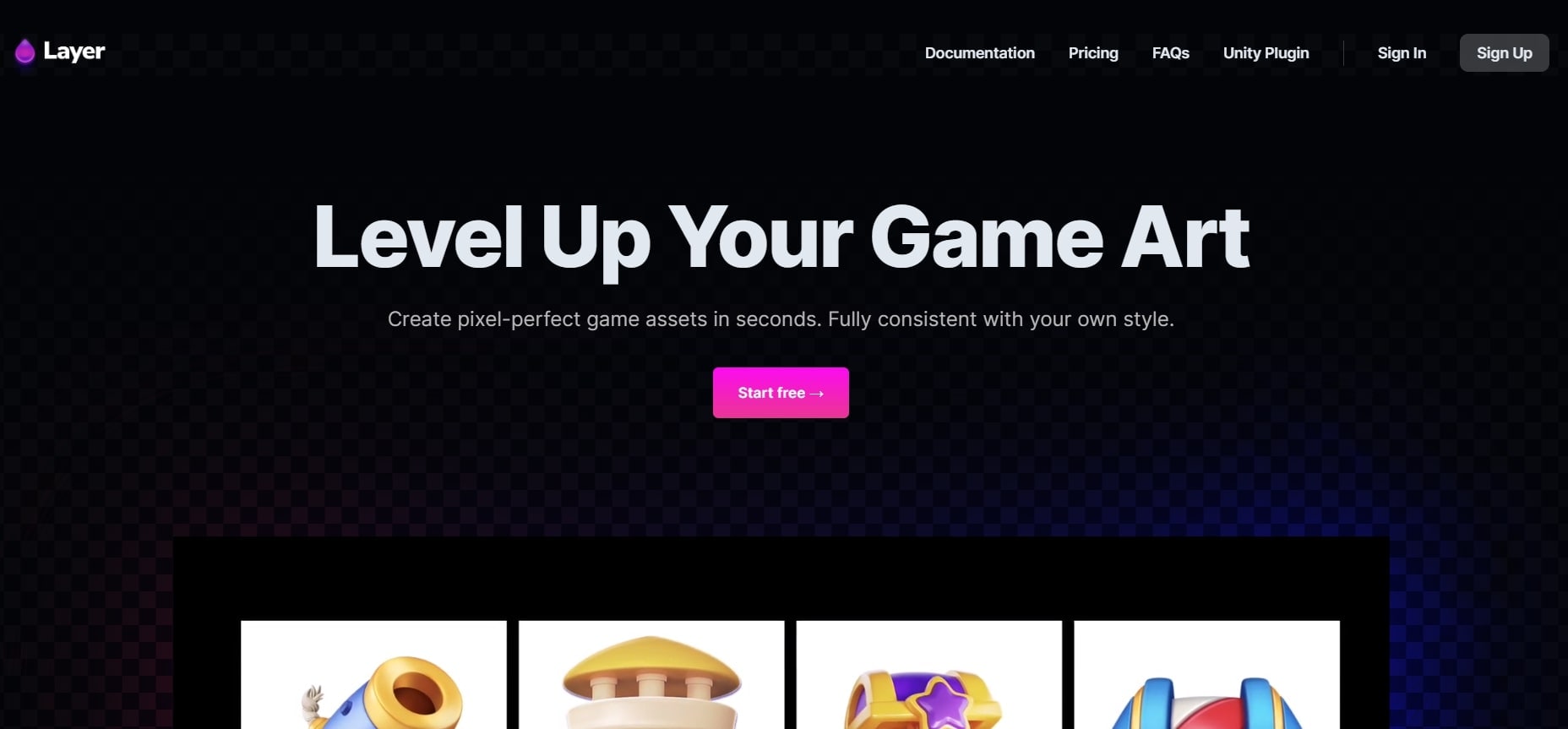
Layer.AI makes 3D processing a breeze to create complex and detailed game worlds. Whether landscapes or lush greenery, you can make various 3D layers exactly how you want. It's a versatile tool perfect for many game development tasks. From crafting immersive environments to assets, it optimizes performance.
Highlights
- 3D Layer Generation: Layer.AI has AI-driven 3D layer generation, creating suitable 3D layers for your game environments.
- Supports a Wide Range of Layer Types: You can create various 3D layers, which is handy for different game styles and settings.
- Customizable Design Parameters: With Layer.AI, you can tweak and customize how your 3D layers look. This flexibility is excellent for game developers who have specific design requirements.
10. Rosebud.AI

Rosebud.AI has a new and creative way to make game code and assets. With Rosebud.AI, you can access powerful features that transform your game development experience. Think of Rosebud.AI as your code-writing helper, animator, game character mind-bender, asset personalization expert, and storytelling partner; all rolled into one.
Highlights
- Game Code Generation: Rosebud.AI is like having a code-writing helper. It uses AI to turn your ideas into real game code, making creating games much quicker and easier.
- Sprite Animator: This feature is like having a skilled animator on your team. It uses AI to bring game characters and objects to life with realistic animations.
- Smart NPCs Algorithms: Rosebud.AI makes non-player characters (NPCs) smart. They can think and act independently, making your games more engaging and exciting.
- Advanced Character and Assets Personalization: With Rosebud.AI, you can be the boss of your game's characters and things. You can make them look and behave exactly how you want.
- Interactive Storytelling Ideas: This feature is great for making games with a great storyline. It helps you create interactive stories with choices and consequences like visual novels.
Things to Remember Before Engaging in Game Development
Important preparations are recommended to ensure an efficient process when developing AI games. Here are some specific considerations and essential preparations:
- Define Your Game Concept
First, have a clear and detailed game concept. Define the game's genre, story, gameplay mechanics, and target audience. Consider creating a game design document (GDD) that outlines all aspects of your game, providing a blueprint for your project.
- Choose the Right AI Game Generator
Carefully evaluate and select the AI game generator that aligns with your project's requirements. Look for generators that offer the desired level of automation and customization. Research and test different AI game generators to find the one that best suits your needs.
- Prepare Game Assets
Gather or create assets like characters, objects, sound effects, and music for your game. Ensure these assets are of high quality and suitable for your project. Use design software for creating and editing assets. Invest in asset management tools for the organization.
- Create a Version Control System
Establish a great version control system to track changes and collaborate with team members. Also, ensure you can easily revert to previous versions if necessary. Utilize platforms like GitHub or Bitbucket for hosting repositories. Also, follow best practices for version control.
- Manage Data Restoration Process with Wondershare Repairit
If software or hardware issues occur, having an AI repair tool on standby is essential for game development. It can help you restore corrupted files that could lead to project delays. Wondershare Repairit is a reliable file repair tool that supports various file formats. It's easy to use and can fix issues like corrupted videos, images, and other assets.
- Test
Regularly test your game to identify and address bugs, glitches, and gameplay issues. Early and frequent testing is crucial for a polished end product. Consider using beta testers, create test cases, and establish a feedback loop to improve your game continually.
Conclusion
That’s all. This article introduced the top 10 AI video game makers that changed how many make games, making them more dynamic and lifelike. They help game creators turn their ideas into games more easily.
But making games is tricky, and sometimes things go wrong. That's where Wondershare Repairit comes in. If anything goes wrong with your game assets or files, Repairit can quickly fix them. With these AI makers and Repairit on your side, you're all set for a successful adventure in AI game development.
FAQ
-
What can AI game generators help me create?
AI game generators can assist in generating game code, creating visual assets, animating characters, personalizing game elements, and even suggesting interactive storytelling ideas for your games. -
Do I need a strong computer or specialized hardware for AI game generators?
The hardware requirements vary, but many AI game generators can be run on standard computers or cloud-based platforms. It depends on the complexity of the tasks you want to perform. -
Can AI game generators replace human creativity in game development?
AI game generators are a valuable tool in game development, but they don't replace human creativity. Instead, they enhance it. These generators are excellent for automating repetitive and time-consuming tasks. Thus allowing developers to focus on more creative aspects of game design. While AI can generate content, the human touch is essential for crafting unique, engaging experiences. AI is a valuable assistant, not a replacement for human creativity in the gaming industry.

![10 Best AI Game Generators [A Comprehensive List]](https://images.wondershare.com/repairit/article/ai-video-game-generator-1.jpg)
 ChatGPT
ChatGPT
 Perplexity
Perplexity
 Google AI Mode
Google AI Mode
 Grok
Grok

